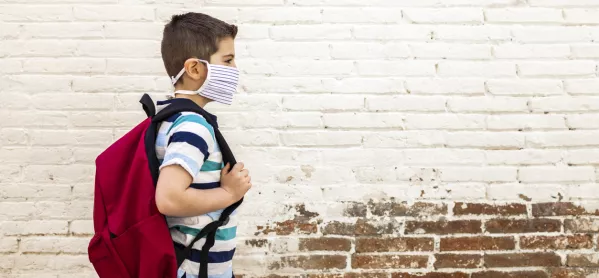- Home
- Don’t assume you know how pupils fared during lockdown
Don’t assume you know how pupils fared during lockdown

A few weeks into the coronavirus crisis, health experts and psychologists were warning that a tidal wave of mental illness could overwhelm children post-lockdown, because of the problems they had stored up during it.
Those fears understandably persist, as the disruption to school life continues well beyond the time initially envisaged.
The fears have, however, been tempered by more recent studies, including a survey of 10,000 parents and children by psychologists at the University of Oxford, which painted a much more nuanced picture.
Varying reactions
Parents of children under the age of 11 largely agreed that they had noticed an increase in stress and behavioural problems in their children as lockdown went on.
But parents of teenagers tended to report that on average their children’s behaviour and emotional wellbeing had continued much as before and they hadn’t noticed any deterioration.
Indeed, some parents - including those with children who had special educational needs or pre-existing mental-health issues - said that their offspring’s emotional behaviour had tended to improve during lockdown.
Schools are rightly concerned about their students’ wellbeing after such a long absence. But the Oxford study reveals not only children’s fragility, but also their resilience. Some will have found the experience an ordeal - but many won’t.
A complex return
How those experiences play out once they connect with the reality of being back in school will be equally complex. And helping teachers better understand which students need what support will be key to how they re-engage with their learning.
One thing we can be certain of: whatever a child’s experience of lockdown, overdramatising the route back to formal learning won’t help anyone.
The schools I work with are avoiding words like “lost learning”, instead emphasising the positive and asking how they can support students to get back on track.
The complication is of course that one approach won’t fit all. And past experience, as they say in the financial world, is no guide to future performance.
What’s more, which students will need the most help won’t always be apparent.
Assessing the true impact
To take a few examples, what approach should teachers take with a student who has been diligently doing the online lessons provided by the school during lockdown?
On the face of it, what’s the problem?
However, teachers have no way of knowing how much learning that student has retained, and especially how much of the curriculum has been retained in long-term memory.
Diligently logging on every day is no substitute for proper teacher interaction, assessment and evaluation.
Teachers will have to discover how much has been retained, a task that will be particularly important in the transition years - from Years 6 to 7, 9 to 10 and 11 into 12.
Or to take another example - schools are understandably anxious about the effect lockdown has had on disadvantaged students, not least because they tend to be the most digitally deprived and less able to access online learning.
But what about those children from relatively affluent families who don’t have devices for every child, or who haven’t been able to give much in the way of parental input because the adults have been working?
Those children’s learning may also have been ‘disadvantaged’ by the lockdown, but schools won’t be able to detect it solely by looking at pupil premium eligibility.
Rebuilding education basics
Finally, although post-lockdown school returnees may prove to be surprisingly resilient, many will have lost the learning and study skills they took for granted pre-pandemic. How to walk into a classroom, how to behave in class, how to listen, how to work together and so on.
One school I know has noticed that the concentration skills of a particular group of returning students, who pre-crisis could concentrate for an hour’s lesson, has declined to about seven minutes.
In most cases, and with the right support, students will quickly recover those learning skills. But there is always a danger that organisations prepare to fight the next battle as if it was the same as the last - and it rarely is.
Managing learning during lockdown will not be the same as supporting students to re-engage with the curriculum on their return.
Yes, children are bound to have been affected by the lockdown, but they will have been affected in different ways and not necessarily negatively.
If schools are to help them as effectively as they can, they need to realise the different starting points children will have and the variety of support that will be required.
But teachers should also take comfort from the fact that for many, if not most, children helping them to re-engage with learning won’t undermine student wellbeing - it will be an essential component of it.
Crispin Chatterton is Director of Education at GL Assessment.
Keep reading for just £1 per month
You've reached your limit of free articles this month. Subscribe for £1 per month for three months and get:
- Unlimited access to all Tes magazine content
- Exclusive subscriber-only stories
- Award-winning email newsletters

